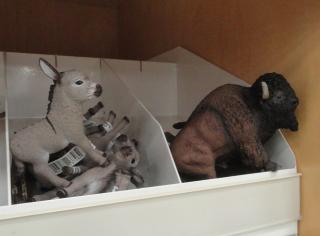Caren Knox / dharmamamma, when her kids were young:
We learn through all five senses, frequently the sixth, and through connection with each other. We learn from books, from magazines, from movies and TV and You Tube Poop. We learn from Barbies, from guns and swords and Bionicles and Legos. We learn through talking, through watching and asking, or waiting. We learn through cooking, shopping, eating, eliminating. We learn from driving or riding the bus or walking or biking. We learn by listening to music, or playing an instrument or singing or banging a rhythm on the table. We learn through living, whatever life looks like that day, whether it's a trip to Discovery Place and the library or a day of not getting off the couch because we're so hooked by David Tennant as Dr. Who we watch all the episodes on the XBox.
There are as many ways to learn as there are... people. Multiplied by infinite ways to learn.
Learning's not an event, it's in every moment.—Caren Knox
How do they Learn?—Caren Knox
photo by Sandra Dodd





